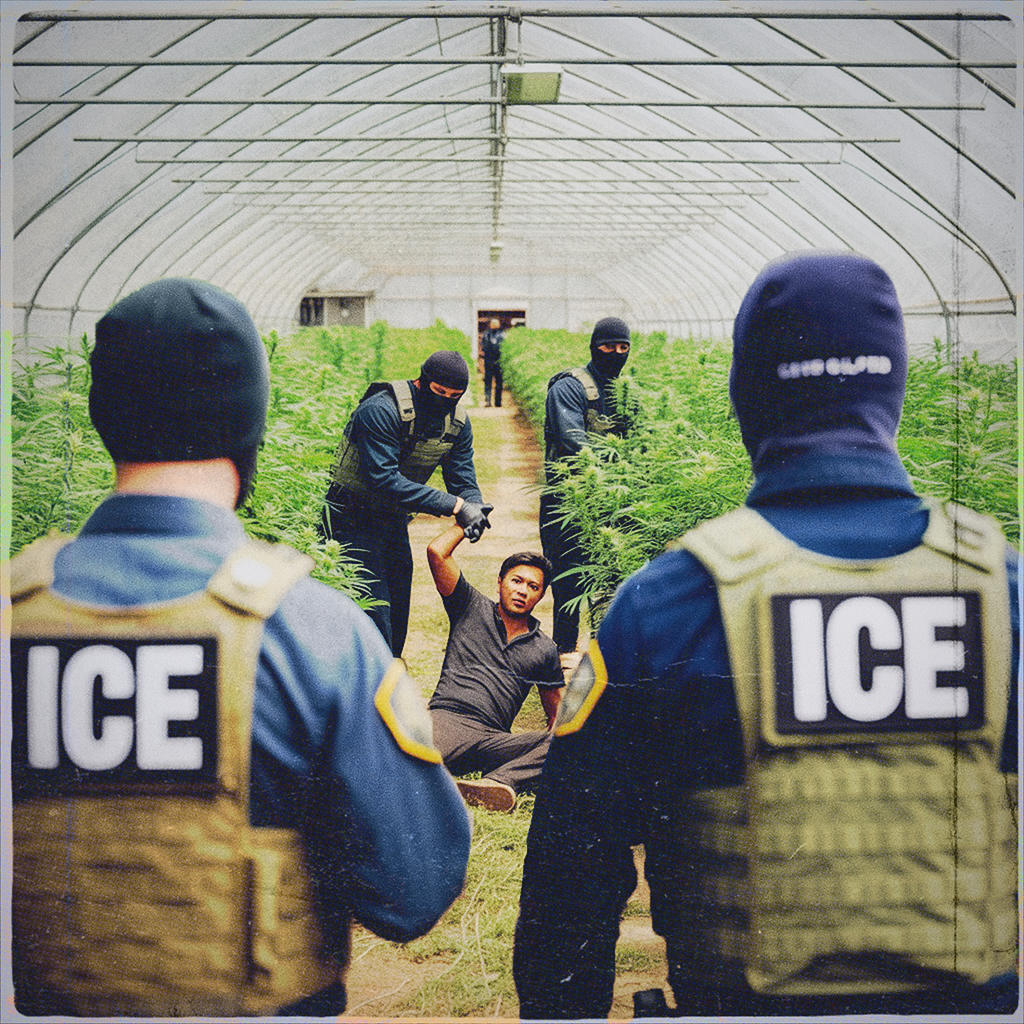A controversial California raid reignites debate over Arizona’s own cannabis laws, labor rights, and limits of federal enforcement in state-licensed industries.
On July 10, 2025, federal agents moved in on two large cannabis farms operated by Glass House Group along California’s central coast, conducting what authorities described as a criminal search targeting labor violations and immigration offenses. The coordinated action resulted in more than 360 arrests and has since reignited questions about how cannabis enforcement operates in states that have legalized marijuana.
The episode was the largest of its kind in California’s regulated market and underscored a persistent tension that cuts across state lines: Cannabis may be legal under state law, but federal authorities still hold the power to prosecute. For Arizona’s growing network of licensed operators, the Glass House raids serve as a reminder that compliance with state rules doesn’t eliminate the possibility of federal action.
A Rapid Operation with Human Costs
The enforcement began before sunrise, when Department of Homeland Security teams and Immigration and Customs Enforcement agents served warrants at facilities in Camarillo and Carpinteria. Though Glass House maintains it has complied with all state licensing requirements, federal officials alleged that minors were among the workforce and that some employees were victims of trafficking.
Eyewitnesses described a scene marked by confusion and fear. Workers fled into surrounding fields. One man, Jaime Alanis Garcia, fell from a greenhouse roof and later died of a traumatic brain injury. His death fueled an immediate debate over the lack of coordinated safety measures during large-scale federal operations.
Labor advocates and union representatives said Garcia’s death was preventable. They argued that cannabis enforcement, particularly when it involves immigration raids, often sacrifices worker safety in pursuit of high-profile arrests.
What’s more, California’s own cannabis regulatory agencies were not informed in advance of the raid, despite having jurisdiction over licensed operators like Glass House. This lack of interagency coordination underscored a growing concern: that federal agents appear willing to sidestep state oversight entirely when pursuing politically advantageous enforcement actions.
The Friction Between State Legality and Federal Prohibition
California and Arizona share a legal framework that treats cannabis as a regulated commodity, subject to licensing, testing, and taxation. Arizona voters approved recreational cannabis in 2020, launching an industry that generated more than $1 billion in sales in 2024 alone.
California’s market has operated under adult-use legalization since 2016, though it has faced persistent challenges with unlicensed grows.
Despite these advances, federal law remains unchanged. Cannabis is still classified as a Schedule I substance, and the Controlled Substances Act grants federal agencies broad latitude to investigate and seize property. While enforcement priorities have shifted over time, the Glass House raids illustrate that federal authorities can and do take action even in licensed environments.
A federal judge in California intervened in the wake of the operation, issuing an injunction that limited further arrests in seven counties. The Justice Department has appealed, calling the restriction indefensible. The legal fight is expected to continue for months, raising questions about whether similar strategies could emerge elsewhere.
For Arizona businesses, the enforcement action has raised concerns. While the Arizona Department of Health Services (ADHS) oversees all licensing and compliance, no provision shields operators from federal investigation.
Many in the industry view this uncertainty as a structural flaw in the legal cannabis landscape—one that leaves both workers and businesses exposed.
Legal experts have suggested that enforcement actions like the Glass House raid reveal a pattern of selective prosecution. While similar labor conditions may exist in other agricultural sectors, cannabis operators—especially high-profile ones—are more likely to be targeted, suggesting the raids serve a symbolic function as much as a legal one.
Recent campaign finance disclosures revealed that executives affiliated with Glass House Farms were contributors to California Gov. Gavin Newsom’s political efforts, raising questions about whether political optics may have influenced federal interest in the operation.
Labor Compliance and the Challenge of Oversight
One of the core allegations levied against Glass House centered on the alleged employment of minors and undocumented workers. The company has denied those claims, citing internal records and licensing documents. Regardless of the dispute’s outcome, the controversy has placed new emphasis on the need for clear labor standards across cannabis enforcement.
In Arizona, like in California, state agencies require that all employees be eligible to work legally. Arizona mandates the use of E‑Verify for all new hires under the Legal Arizona Workers Act, while California’s cannabis regulators enforce eligibility and safety protocols through licensing standards. However, the complexity of agricultural labor markets, combined with inconsistent federal priorities, has created an environment ripe for confusion and, at times, abuse.
Industry observers say that as cannabis continues to transition from an “illicit” enterprise to a regulated industry, questions about fair labor practices will remain front and center.
For operators, the lesson is that robust record-keeping, worker protections, and clear communication with regulators are essential—though not always sufficient—to avoid entanglement in federal investigations.
Civil Liberties and Public Perception
Civil liberties advocates have argued that the Glass House operation swept up hundreds of people without individualized evidence of wrongdoing.
According to court filings and post-raid reporting, of all arrestees, only four were found to have prior criminal convictions. Many were released without explanation, only after deleting photos and videos of the raid from their phones, according to reports.
Just weeks after Trump proposed keeping undocumented laborers in the fields, federal agents returned to form with a raid that drew more comparisons to mass roundups than immigration reform.intimidation rather than public safety.
Critics contend that cannabis enforcement, when combined with immigration policy, becomes a tool of intimidation. Others argue it’s part of a broader, historical practice of conflating cannabis—and by extension, communities of color—with criminality. What’s clear is that few still believe these raids have anything to do with public safety.
Public reaction has been mixed. Some communities view enforcement actions as necessary, while others see them as evidence that legalization has yet to deliver on promises of transparency and fairness. In Arizona, where the cannabis market has steadily matured, consumers and businesses alike are watching carefully to see whether federal agencies plan similar initiatives.
Media coverage has varied in tone, with some reports emphasizing alleged trafficking concerns and others focusing on the humanitarian costs. For many stakeholders, the raids have become a litmus test for how cannabis enforcement will evolve in the years ahead.
Policy and the Road Forward
The clash between state and federal authority is not new, but it has taken on added urgency as more states adopt regulated cannabis markets. Arizona’s cannabis enforcement landscape is shaped by Proposition 207 and a web of regulations that dictate everything from packaging to taxation. Yet none of those provisions can nullify federal jurisdiction.
Industry leaders and policymakers are now grappling with how to reconcile these competing systems. Some have called for clearer guidelines that respect state legalization while maintaining safeguards against exploitation. Others advocate for comprehensive reform of federal cannabis laws to bring them in line with evolving public attitudes.
For businesses operating in Arizona and California alike, the stakes are significant. The Glass House raids are a stark reminder that the promise of legalization remains incomplete without meaningful alignment between state and federal cannabis enforcement policies. Until that happens, operators must navigate a landscape defined by progress—and persistent uncertainty.

***
GreenPharms is more than just a dispensary. We are a family-owned and operated company that cultivates, processes, and sells high-quality cannabis products in Arizona. Whether you are looking for medical or recreational marijuana, we have something for everyone. From flower, edibles, concentrates, and topicals, to accessories, apparel, and education, we offer a wide range of marijuana strains, products and services to suit your needs and preferences. Our friendly and knowledgeable staff are always ready to assist you and answer any questions you may have. Visit our dispensaries in Mesa and Flagstaff, or shop online and get your order delivered to your door. At GreenPharms, we are cultivating a different kind of care.
Follow us on social media






